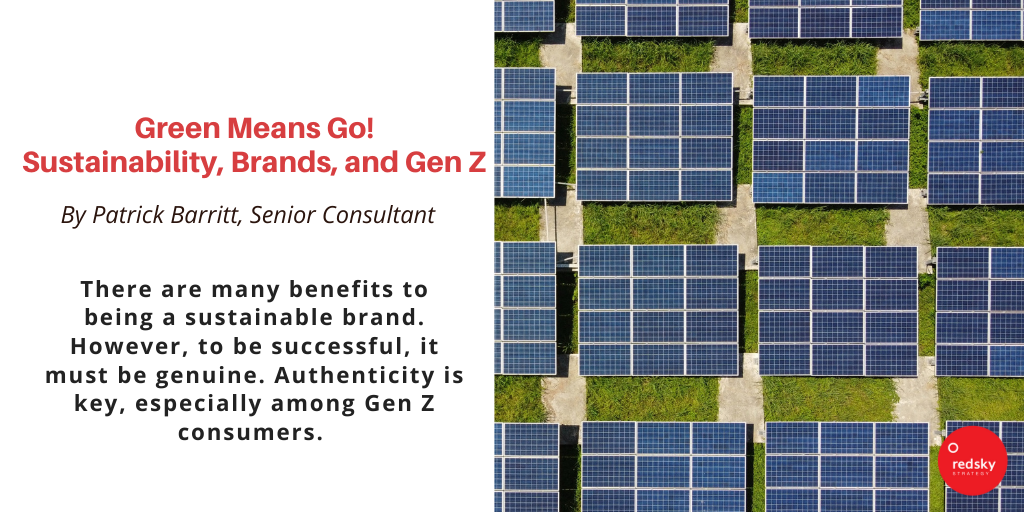News
Green Means Go! Sustainability, Brands, and Gen Z

Image Credit: https://unsplash.com/photos/hxUcl0nUsIY
Gen Z are the consumers of the future; to appeal to them with longevity and target them accordingly, brands need to understand their desires.
This age group, which makes up about 40% of global consumers, deeply values sustainability and judges brands by the impact their actions have on the planet.
First Insight research of Gen Z shoppers shows:
- The large majority of Gen Z prefers to purchase from sustainable brands
- Gen Z is willing to pay up to 10% more for sustainable products
- Out of all generations, Millennials and Gen Z are the most likely to base their purchasing decisions on social, personal, and environmental values and principles
- 66% of global consumers are willing to pay more for products and services from companies that are committed to positive social and environmental impact
This phenomenon represents somewhat of a paradox: not putting profits first can be profitable.
There are many benefits to being a sustainable brand. You can gain loyalty among future consumer groups and demonstrate ethical solutions. For these efforts to be successful, they have to be genuine– authenticity is key.
Public pressure has increased in recent years in terms of the standards for corporate and product sustainability initiatives. Gen Z has particularly high expectations and they want companies to do more than just swap out plastic straws for paper ones.
Since we wrote about it last Earth Day, greenwashing has received even more attention. A new website Greenwashing.com launched solely to fact check the environmental claims of fashion companies. As with diversity and inclusivity initiatives, superficial and performative measures aren’t enough. In many cases, it can actually backfire by making brands look disingenuous.
Sustainability Initiatives: Trends and Examples
We’re seeing a handful of popular trends emerging to address sustainability and among the most common are a shift in shipping and packaging practices. In an increasingly digital world, many retailers are shifting their focus to online ordering. Even if there’s an underlying sustainability intention, shipping everything is bad for the planet—at least with the way we currently ship.
However, the circular economy offers an alternative that can allow for a greener approach to shipping and online shopping. The circular approach centers around the concept of “take-make-reuse” instead of the “take-make-waste” consumption model traditionally used.
For example, Sendle is a company that offers compostable mailers. In 2020, the brand partnered with Bonds Couriers to provide a solar-fueled fleet of Electric Vehicles (EVs) for small business deliveries.
A Fashionable Shift to Slow Production
Gen Z has also embraced traditional aesthetics and means of production, with a focus on extending the longevity of something they own. This is changing their relationship to shopping and owning things.
With fast fashion dominating the retail industry for years, we’re starting to see more designers and brands adopting sustainable production practices and moving toward “slow fashion”, which involves approaching fashion with careful considerations of the processes and resources involved in the clothing making process.
Spring 2022 fashion season highlighted the sustainability efforts of some of the biggest up-and-coming young designers, such as Harris Reed, which included using upcycled materials in their designs. Fashion designers, such as Gogo Graham, using deadstock (the unused fabric from other designers) in their own garment production can prevent the material from ending up in a landfill.
Another example of the circular economy in the fashion and retail industry is the rise of second-hand online marketplaces, such as Etsy and Poshmark where consumers can find used products. Localized marketplaces such as Facebook Marketplace also take sustainability a step further by eliminating the need for shipping on secondhand goods.
Regenerative Solutions for Reducing Waste
It’s likely we’ll see the pressure continue to rise for brands to adopt regenerative solutions and reduce waste. The European Commission revised its Packaging and Packaging Waste Directive with the goal of ensuring all packaging in the EU market be recyclable or reusable within the next eight years. Last year, home-cleaning and personal care brand Grove Collaborative became the first plastic-neutral retailer in the world, aiming to become completely plastic-free by 2025.
Supermarkets as well as home and health brands have started to shift towards refillable packaging and bulk grocers. To help further reduce waste, online platforms such as Zero Waste Store feature sustainable brands and products that are ethically sourced.
The Appeal of Authenticity
Consumers are attracted to authenticity and value-oriented products. As sustainability continues to become an important value for many, brands must participate in sustainable practices and learn how to effectively communicate their sustainability stories.
There are many different ways for brands to communicate their sustainability stories, but it’s essential to find an authentic way that resonates with consumers. Sustainability is a complex issue, so it helps to simplify the message and make it relatable to consumers.
Some tips for brands looking to communicate their sustainability stories in an authentic way include:
- Educating consumers on the importance of sustainability and how it relates to their everyday lives
- Connecting with consumers on an emotional level by sharing stories about the positive impact that sustainability can have
- Being transparent about the brand’s own sustainability journey and highlighting the progress that has been made (annual sustainability reports, updates, etc.)
- Partnering with environmental charities and supporting social causes important to your consumers and brand values
- Encouraging consumers to take actionable steps towards creating a more sustainable world
Sustainability no longer means neutrals and bamboo. It has become very experimental and expressive – which is why brands should embrace creativity and fun. Authenticity and transparency are essential when engaging Gen Z on sustainability, but so are joy and innovation.
Interested in working with RedSky Strategy? We look forward to helping you learn how to leverage Innovation to intuitively tap in your consumers’ needs and fuel your brand’s growth.
